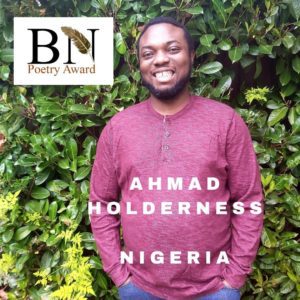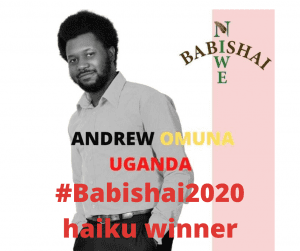AHMAD HOLDERNESS FROM NIGERIA; POET, DOCTOR, AND FATHER

I am a medical doctor, a husband and a father amongst other things. I write long-form and short-form poems (haiku) and some of my haiku can be found in journals such as on Frogpond, Chrysanthemum, The Mamba, Creatrix, Acorn, and Haiku Presence. Also, I was shortlisted for this award in 2017 Haiku Awards and have some works in Africa Meets Vienna Afriku Anthologies. I nurture a dream to prescribe my poems as pills and this influences my writing. Beyond this influence, I write mainly because writing is a gateway to all the identities I have become. I am a man and in addition to how I have described myself earlier, I am a Muslim, an African, and many other subtle identities that must find balance within the package I consider as myself. As you can perceive, I am trying to simplify myself, thus it can be said that I am a complex man who writes to simplify himself.
Why were you inclined to submit for the #Babishai2020 haiku award?
I was inclined to submit for this award because I was certain that it would be competitive. For the past few years, Babishai has been a platform that has greatly contributed to showcasing the talents of African poets, especially in the Haiku genre and I am proud to be associated with this progress.
What was your process in writing this particular haiku below?
bitter kola
grandpa breaks into
a new tale
As simple as this haiku looks, it packs a punch. I started writing it in my mind, drawing from the sights of what I see the African society becoming. The elders in African culture are considered wise men and the tales they tell are known to guide/admonish the youngsters about the moral codes as well as the needs of the African society. The process of writing this haiku evolved just as the reality of the evolving cultures around me. So, what came to me first was a common retort I use when I am slightly surprised and unprepared for something and I simply utter; snap. Next, I asked myself what snaps? The first picture that came to my head was the error message you get when you can’t access a webpage. I played around this idea and this launched my mind to search for deeper meanings from exploring my thoughts and my experience and I think I came up with my first draft when I had a cough/cold and recalled how orogbo (bitter-kola) was considered a good remedy for it and how it snaps into two when you break it. This moment was the key element in writing this haiku as it juxtaposed all my memories/experience relating to the key elements of the haiku, so I took out my phone and typed my thoughts in the Notes app.
Once the draft was written, I revisited it every night; I do this usually with all the other poems in my notes app and review and amend them accordingly. Once I made a mental note that the poem has reached the state of perfection of what I needed it to express, about metamorphosis, I just knew I would be submitting the poem for the Babishaiku Haiku awards. I finished writing the poem perhaps six months before the call for submission for the Babashaiku awards. To describe the process in one word, I would say it was empirical.
In your opinion, what is the future of African haiku?
Permit me to unsheathe a philosophical response to this question;
When is a door not a door?
The answer to this riddle and the riddle itself is how I see the future of African Haiku. While some may consider growth as linear, I tend to see it as cyclical. What is clear is that what many perceive to be walls or barriers to their growth are actually doors. Once an African poet realizes this, the door is no longer a door and the influx of talents into what is behind the door (the future) is an exciting adventure that promises if not guarantees excellence. In other words, the future of African Haiku depends on those who realize the potential use of Haiku, the brevity it offers, the emotion it packs and moment in time it captures as a form of portal into a multiverse that documents and celebrates the African tradition and its people in a form that is elegant and reminiscent of the hopes of our forefathers.
How are we able to share about this haiku experience, with Nigeria, and the world?
The easiest way to share this experience is to gift it. The foundation has done well by positioning itself as a platform that identifies talents and sharing this haiku experience can be done through haiku workshops and also by supporting/creating journals where Nigerians and the world at large can explore this unique art. There still a long way to go but it is very exciting and creating a viable network of artisans and administrators for this purpose will surely reap immense benefits. We need to design and enrich a museum where these works can be appreciated.

